Wouldn’t you like the opportunity to be able to take a view on a cryptocurrency without having all the risk of the position?
This is where cryptocurrency options come in and they provide a whole host of opportunities for you to make the most out of crypto market volatility.
Where can you trade these options and what sort of strategies can you use? Could we eventually see cryptocurrency options hitting an exchange such as the CME or CBOE?
These are all questions that we will attempt to answer in this piece.
What are Cryptocurrency Options?
Options are derivative instruments that give the holder the right to buy or sell a cryptocurrency at a predetermined price (Strike price) sometime in the future (expiry time).
Options have been a part of the general financial markets for decades and were originally used by farmers in order to secure the price of their crops when they were brought to the market. Since then, the option markets have grown to almost eclipse the traditional financial markets.
Options are a great way to hedge financial risk from unforeseen events. They are also used regularly by options traders in order to make a profit on very volatile financial assets. This is why they would be ideal for cryptocurrency trading.
Before we can take an in-depth look at cryptocurrency options, we have to cover some basic option theory.
Option Basics
There are two types of options that one can buy. These are a CALL and a PUT option. A CALL option gives the holder the right to buy an asset at the strike price. A PUT gives the holder the right to sell an asset at a predetermined price.
The cost of buying an option is called the option premium and this price is determined by a number of factors. These include such variables as the strike price, the current price, the time to expiry and the volatility. A full overview of these factors is beyond the scope of this text but you can read more about option pricing here.
What is important to understand is that someone who is buying a CALL option is hoping that the price of the cryptocurrency asset will increase in price and will be above the price of the Strike price at expiry of the option. The opposite can be said for the buyer of a PUT option.
To get an idea of how the pay-out graph of an option works, take a look at the below image. As you can see, the value of your position will increase as prices rise with a CALL option or as they fall with a PUT option.
 PUT and CALL Payoff diagrams. Source: wikipedia.org
PUT and CALL Payoff diagrams. Source: wikipedia.orgThe most important thing though is that with either option, your downside is only limited to the amount that you have invested in the premium of the option. This is the maximum loss for an option investment and gives the buyer certainty in their potential losses.
However, the upside on a position where you have bought an option is unlimited. Hence, you can make multiples on your investment. This of course assumes that you have bought the option in question and have not sold it. The latter would imply the opposite.
How They Differ From Futures
You will no doubt have heard a lot about cryptocurrency futures that you can trade. These are relatively similar to options in the sense that they are both derivatives on an underlying cryptocurrency asset.
The main difference between them though is that a future does not give the holder the option to exercise the contract. They have to settle the contract irrespective of the price of the asset. This therefore means that the holder's loss is not limited.
Below is a simple graph of a futures contract. As you can see, there is unlimited upside on the position but there is also unlimited downside. You can either be long or short the futures contract.
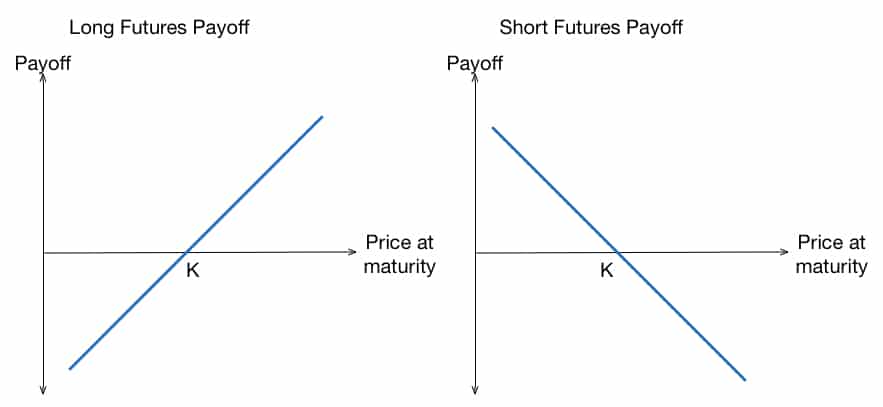 Long and Short Future Payoff diagrams. Source: brilliant.org
Long and Short Future Payoff diagrams. Source: brilliant.orgDue to the fact that futures do not have optionality, there is no investment required in terms of the option premium. So, with a future, you do not have to pay a premium but that comes at an added risk of larger losses.
Where to Trade Crypto Options
Despite the fact that options on cryptocurrencies make a lot of sense, there is only a handful of places that you can trade these sort of instruments. There are still no regulated instruments available for trading on any of the large options exchanges around the world.
There is also no indication from the likes of the CBOE or the CME that they would be considering this anytime soon. They have only just recently started offering Bitcoin futures and they are trying to assess the impact of these.
However, there are still a few places that you can trade cryptocurrency options. They differ in terms of their minimum investments as well as the type of instruments you can buy.
OTC Options
While there are no standardised cryptocurrency options that you can buy on an exchange, you can always structure a more bespoke financial instrument in an OTC trade. These derivatives will have a defined counter-party who is willing to sell the option to you.
 Source: LedgerX & CFTC
Source: LedgerX & CFTCThere are already a number of OTC cryptocurrency option brokers that are around today. For example, you have companies such as Ledger X. They are a CFTC registered Swap Execution Facility (SEF) and Derivatives Clearing House (DCO).
They are able to structure an option for a client and will find the counter-party to the trade on the market. They will also handle the transaction and make sure that the option writer has enough money in their account in order to fund the position.
So what is the catch?
In order to trade on LedgerX, you need to be an "eligible swap participant". This means you have to meet a number of requirements. The most important of these is that you would need at least $1m in investable assets (coins or otherwise).
If this is something that if you happen to have, then you can give LedgerX a call to discuss their services. If not then there are a few other options that you can consider.
Deribit Options Exchange
If you do not mind trading on a slightly smaller exchange then you could consider the likes of Deribit. This is an exchange that is based in Holland and they offer quite a liquid market for Bitcoin options. They also seem to have a pretty solid reputation and you can read more about them in our Deribit review.
Below you can see their trading interface with the range of different Bitcoin options, their expiry dates and their strike prices.
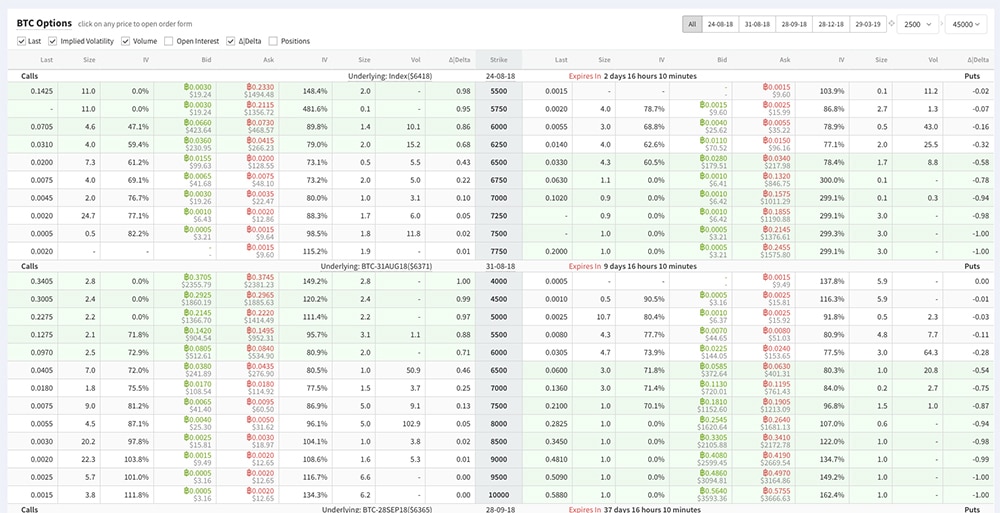 Screenshot of Deribit Exchange Platform. Source: Deribit
Screenshot of Deribit Exchange Platform. Source: DeribitThe trading platform seems to be quite advanced and has everything that a discerning option trader could possibly need. For example, they have all of the option "greeks" that one will use in order to price options. You can get a sense of how volatile the market thinks the assets are by their implied volatility.
Deribit also offers futures contracts but they are trying to make a name for themselves as the foremost Bitcoin options exchange. There are no minimum funding requirements as the size of the contracts are determined by the market. If there is a counterparty that is willing to take the opposite side of your order then your trade will go through.
Deribit will make a fee on the option that is traded which is 0.04% of the underlying or 0.0004 BTC / option contract. You can get a 10% trading discount at Deribit for 6 months by signing up here.
Synthetic Option with BitMEX Futures
For those of you who have traded futures in the past, you will no doubt have heard of the BitMEX exchange. They were probably one of the first exchanges to offer Bitcoin futures.
So what does this have to do with cryptocurrency options?
While BitMEX only offers futures, you are able to structure a futures instrument that can have a payout that is quite similar to that of a vanilla option. You can enter into a highly leveraged futures position and place market stops below it. This would create a sort of "synthetic" crypto option.
If you place these stops in a strategic position then you are able to still limit your downside risk by a certain percentage. For example, if an option premium is usually 20% of the value of the notional, then you can place stops that would limit the downside loss to this amount.
In the below image you can see this in practice. We are using the calculator to determine a 20% cost on our position with 100x leverage. This will give us the price that we would have had to have closed out at in order to lose 20% of our position. This is the synthetic "option premium". Then, on the right of the image we have the stop order form where we will be selecting that level.
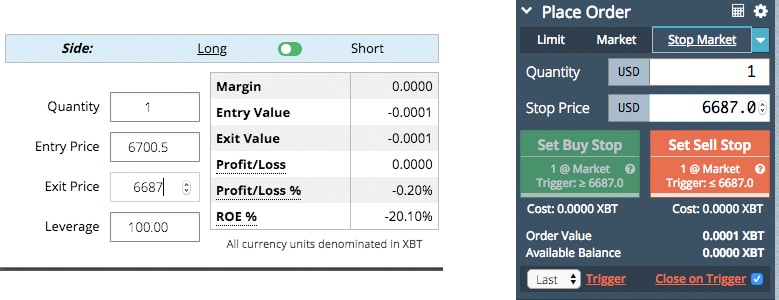 Creating a Synthetic Option on BitMEX with 100x Leverage
Creating a Synthetic Option on BitMEX with 100x LeverageYou will still have all the upside potential should the position move significantly in your favour. BitMEX is probably one of the best futures exchanges to try this tactic on. This is because they are known for having an incredibly advanced trading engine which will quickly execute your orders.
If you wanted more information on how the exchange works, how to fund your account and place your orders then you can read our comprehensive BitMEX review.
Now that you are aware of a few of some places that you can trade options, lets look at some strategies that you can employ with them.
Crypto Option Strategies
The great thing about options is that you can combine them in order to structure a range of well-known option strategies and spreads. These will allow the trader to profit from movements in not just the price of the asset but also on general movements in the underlying volatility.
Although there are numerous strategies that one can employ with crypto options, we will take a look at some of the most well-known strategies and spreads that you can trade on Bitcoin today.
Bull and Bear Spreads
Option spreads are strategies that attempt to sell away the upside on a CALL or PUT in order to help fund the position. You can still earn a profit if the crypto asset moves in the direction that you were hoping, but this will be limited.
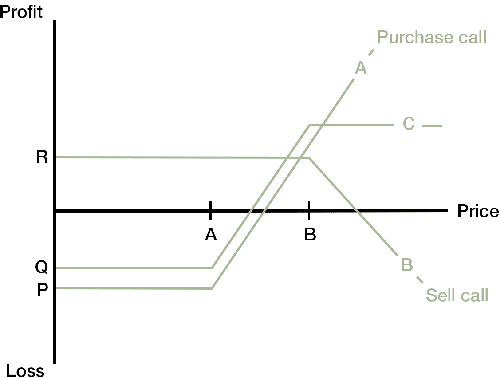 Bull CALL Spread. Source: Treasury Today
Bull CALL Spread. Source: Treasury TodayThere are two types of spreads and they are a bull and a bear spread. They both rely on a combination of a long and short options at different strikes. For example, to the right is a bull spread (C) with a long CALL at (A) and a short CALL selling away the upside at (B).
The hope with this strategy is that the price of Bitcoin will rally and you will get the defined profit. Although you have capped your upside, you have also limited the potential loss on the position to a smaller amount than if you had bought a CALL outright.
A bear spread works in the opposite direction and involves selling a PUT option with a strike below the strike of your long PUT. You will hope that the price of the asset will decline and although you have lost a lot of the upside, the strategy has cost you less money.
Straddles
Another really interesting strategy that you can use is something called a "straddle". This is essentially a strategy that involves buying or selling two different options and the same price. It will either be called a long straddle or a short straddle.
These are really effective strategies that will allow you to take a view on whether there be volatility or not, irrespective of how the price decides to move. They are strategies that are based purely on the volatility of coin.
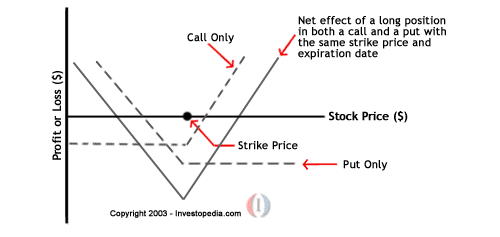 Long Straddle. Source: Investopedia
Long Straddle. Source: InvestopediaFor example, in the graph on the right we have a long straddle. This is structured by entering a long CALL and a long PUT at the same strike. As you can see, the only way the trader will lose is if the price does not go anywhere.
So, the hope of the trader is that the price of the coin will either rally or fall rapidly. He will still get paid. This type of strategy is quite expensive as you are buying two options. If the price does not move then you could lose both option premiums.
The short straddle works the opposite way around where you will sell a CALL and a PUT at the same price. The hope with this strategy is that the price will remain stable. However, this is more risky as your losses are not limited. If the price were to react violently you could lose a substantial amount of money.
Option Butterflies
Of course, you can also combine a straddle with two more options to create what are known as "butterflies". These allow you either take a view similar to that of a short straddle but protect your downside, or to structure a cheaper long straddle by selling some of the upside.
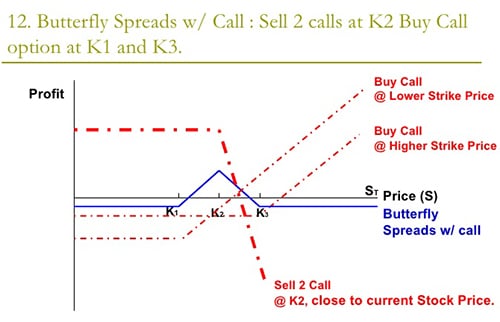 Long CALL Butterfly. Source: Slideshare
Long CALL Butterfly. Source: SlideshareFor example, in the graph on the right we have a long CALL butterfly. In order to create this butterfly, the trader has to sell two calls at K2T, buying a call at K1 and buying another call at K3.
The benefit of this strategy is that you can still take a view that volatility will be relatively flat until expiry, but you are also protecting yourself from the unlimited downside. Of course your payoff in the middle will be reduced.
You can also enter into a short PUT butterfly strategy using PUT options instead of CALLs. This trade could be a cheaper alternative to the long straddle strategy funded by selling away some of the unlimited upside.
Other Strategies
The strategies that we have mentioned here are only a small subset of the variety that you can employ. You can use different strike prices of the options or structure them at different "moneyness" rates.
You can develop option strategies that use different expiry times thereby structuring what are called "calendar spreads".
However, a lot of these strategies may be limited to the range of cryptocurrency options that you have on the exchanges. Whether you can find an option needed to recreate the strategy on Deribit is not certain. It will really depend who is willing to meet the opposite end of the trade.
Conclusion
Cryptocurrency options are in a nascent stage currently. They still have some way to go before they can be seen on the same level as other derivative assets such as futures and CFDs (Contracts for Difference).
However, there are a few other alternatives for you to get involved with cryptocurrency options. If you have the required funds available, then an OTC brokerage such as LedgerX should be considered. For the vast majority though, the next best bet is to use an exchange such as Deribit which has a relatively healthy Bitcoin option market.
If you would like to structure your own options with other assets on BitMEX then this is also an alternative. However, make sure that you know how to place the market stops and that you have also set liquidation orders below them as a precaution.
Lastly, you should also take care when trading cryptocurrency options and make sure that you are fully comfortable with them. Never invest more in an option trade than you are willing to lose. The only thing that is certain in the option markets is that there will be uncertainty.



